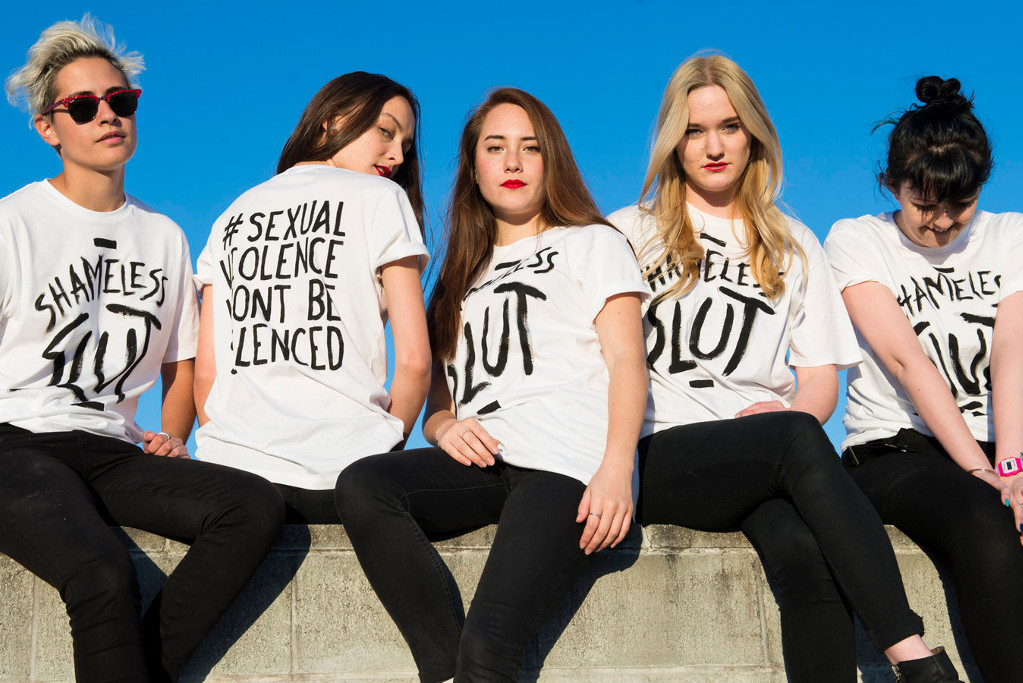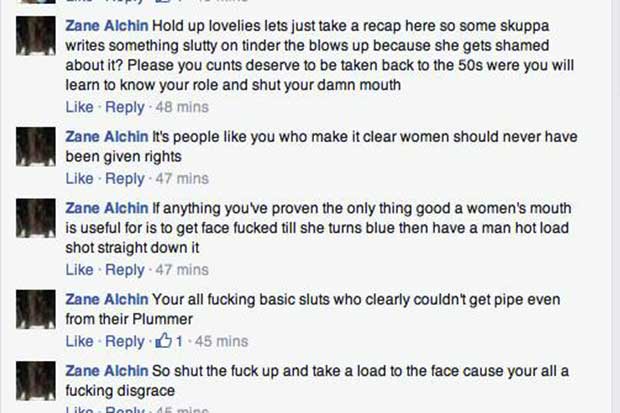On Zane Alchin, “Banter” And How Online Abuse Is Intrinsically Linked To Real Violence
This is all part of a much larger problem.

Any woman who has spent enough time on the internet knows a little something about abuse. Threats of rape and violence are the bread and butter for men who want to silence women online, and lately it’s been working. In July alone, Ghostbusters actress Leslie Jones temporarily left Twitter after a deluge of racist and sexist abuse, radio personality Sam Frost told her trolls they’d won while talking about her declining mental health and feminist writer Jessica Valenti announced she was taking time away from social media after someone threatened to rape her five-year-old daughter.
For the most part, the men behind the abuse are getting away with it. Law enforcement in Australia (and around the world) traditionally hasn’t dealt well with online abuse. Twitter and Facebook also have notoriously bad track records with responding to abuse on their platforms (a fact that won’t come as news to anyone who’s been told violent comments didn’t violate their community standards). Even the CEO of Twitter recognised his company sucks at dealing with it.
We are making small steps forward. Convictions are being made. Punishments are being given. But, for all the struggle it takes to get to this point, is anything actually changing?
–
Zane Alchin And The Uphill Battle For “Basic Sluts”
Zane Alchin, the man behind the recently publicised ‘Tinder shaming case’, was sentenced last Friday to a 12-month good behaviour bond for using a carriage service to menace, harass or cause offence. This crime comes under Section 474.14 of the federal Criminal Code of which the maximum penalty is three years imprisonment. Alchin avoided jail time, but will record a criminal conviction.
The case is being celebrated as a victory, though it wasn’t an easy one. The victim acknowledges Alchin may have only received a slap on the wrist if it weren’t for an advocacy group, Sexual Violence Won’t Be Silenced, which supported her. Spokesperson for the group Paloma Brierley Newton has been at the frontline of this case since it began last August. She was in court when Alchin was sentenced last Friday and told us she was pleased he recorded a conviction.
“I don’t think that jail time was necessarily appropriate because I think it would make someone hate women more, rather than make them think about their actions,” she said.
In case you missed it, this case began when 23-year-old Sydney woman Olivia Melville had a screenshot of her Tinder profile posted to Facebook by another user, Chris Hall. Olivia’s profile featured the Drake lyric: “Type of girl that will suck you dry and then eat some lunch with you”, which prompted for Hall to share the screenshot on Facebook and caption it: “stay classy ladies. I’m surprised she’d still be hungry for lunch.”
Olivia became aware of the post, and after some back and forth between her, Chris and some friends from both sides, Zane Alchin (a friend of Hall’s) launched into a tirade of sexually explicit comments towards the women.
“It’s people like you who make it clear women should never have been given rights,” he wrote. “Your (sic) all fucking basic sluts who clearly couldn’t get a pipe even from their plummer”.

After Paloma approached the police about the comments, Alchin was charged with using a carriage service to menace, harass or cause offence and pleaded guilty in June. Paloma said this was the verdict she was expecting, and when considering the precedent set by other cases, Alchin’s sentence was not surprising.
In 2013, Dylan Deblaquiere and Daniel McDonald both received 12-month good behaviour bonds for their involvement in the Defence Force’s ‘Skype sex scandal’. Both men were charged with using a carriage service in a way which was offensive after McDonald used Skype to stream himself having sex with a female cadet to a roomful of his friends, including Deblaquiere.
In May of this year, NSW man Chris Nelson was charged with using a carriage service to offend after sending racist and sexist abuse to former Labor senator and Aboriginal woman Nova Peris over Facebook. His comments included telling her “You were only endorsed by Juliar because you were a black c***,” and “Go back to the bush and suck on witchity grubs and yams”. As punishment, he received an eight-month suspended sentence, a $2,500 fine and was placed on a two-year good behaviour bond.
This is encouraging — victims of online abuse have historically had incredible difficulty in having these kind of offences acknowledged by authorities at all — but is it actually having any effect on the men who perpetrate or defend the abuse?
A Sydney man laughs as he avoids jail for absuive, threatening comments to women on #Tinder. #TenNews https://t.co/hkhPB4dMpS
— Hugh Riminton (@hughriminton) July 29, 2016
–
“How Can You Overreact To A Crime?”
Though Paloma was happy with the outcome of the Zane Alchin’s sentencing, she told us “watching the judge and the way that he spoke about it was like watching a trainwreck”.
The judge, William Pierce, described Alchin’s comments in relation to sports. He explained that in a game of football, all players expect a few hits, but in this game, Alchin had taken it too far. “Your sexually explicit comments were the equivalent to socking someone in the jaw with a solid right hook — you overdid it,” Pierce said.
Just to be clear: we’re talking about a man threatening women with rape.
According to The Guardian, Alchin’s lawyer said: “He’s meant to be the face of trolling when in actual fact it was a couple of hours out of an afternoon of a young man’s life who was of completely good character until that time”. It’s impossible to ignore the parallels between the discussions in this case, and in cases of ‘real life’ violence against women.
#brockturner father: son not "violent" only got "20 mins of action" shouldn't have to go to prison. @thehuntinground pic.twitter.com/IFECJs687b
— Michele Dauber (@mldauber) June 5, 2016
Last year Luke Lazarus received glowing references from high-profile members of the community after anally raping a young woman outside of his father’s Sydney nightclub. “I have always observed him to be a respectful, courteous and obliging young man who has, on my observation, never displayed even a hint of unlawfulness in his conduct,” said Nick Pappas, chairman of the South Sydney Rabbitohs.
It was in this vein that Alchin’s defence argued Paloma had “overreacted” to his comments. But to argue that an online threat of rape is harmless and that women are overreacting, trivialises the experiences of women who frequently endure this abuse. As Paloma said, “How can you overreact to a crime?”
Violence against women occurs on a spectrum. At one end is the most obvious: a woman who is abused in a domestic partnership or accosted on the street while walking home alone at night. As a nation, we condemn it. At the other is what some might argue is more of a grey area: think Eddie McGuire talking about drowning a female journalist, boys at Brighton Grammar calling their classmates “sluts” and describing sex acts they would do to them, and of course, Zane Alchin. It’s often brushed off as a mistake. It’s sometimes defended as a joke or simple banter.
Meanwhile women are told to get over it with statements like “you’re just taking it the wrong way” and “don’t you think you should be paying attention to the bigger issue” and “women are being killed you know”, as if physical and verbal violence are two mutually exclusive things. These comments may not be violent in and of themselves, but they stem from a place of male entitlement and disrespect for women. Abuse and violence are intrinsically connected.
Here are some of Alchin’s other comments:
“You know the best thing about a feminist [is] they don’t get any action so when you rape them it feels 100 times tighter.”
“If anything you’ve proven the only thing good a women’s (sic) mouth is useful for is to get face fucked till she turns blue then have a man hot load shot straight down it.”
“So shut the fuck up and take a load to the face cause your (sic) all a fucking disgrace.”
These quotes can’t be misconstrued. They are an attack based entirely on gender and to suggest women are overreacting to comments such as these is an insult to not only them, but those who experience other forms of violence.
Paloma said she hoped this case would provide leverage to talk about the underlying issue of the case. “It wasn’t really about one person and their horrible comments, it was about the problem within society with how women are treated and that goes straight from young men that do it, to the old men that take care of them,” she said.
It’s promising that cases such as this are being taken seriously enough to appear in court. But, moving forward, it’s important that these aren’t seen as one-off mistakes. They are part of a much larger problem.
–
Lindsey Green works in community radio and is completing her Honours in journalism, researching the online abuse of female journalists. She tweets about podcasts, the Kardashians and feminism at @LindsJGreen.